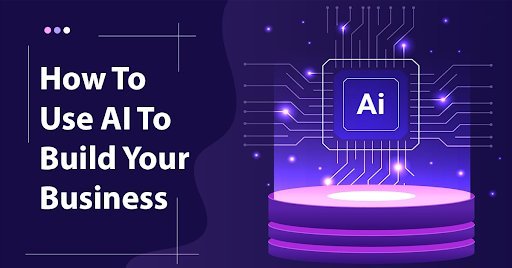How to use AI to build your business
To realize the business potential and learn how to use AI to spur innovation and growth, use data analysis, customer experiences, risk reduction,etc.

In today's business world, AI technology has become essential for organizations. Noveo.ai claims that, in the face of intense competition and ongoing change, it enables businesses to flourish through adaptation. AI is changing many aspects of business, including sales, customer service, data analysis, and product innovation. Businesses can acquire a competitive edge, streamline procedures, and provide customers with greater value as AI capabilities increase. The utilization of AI is examined in this guide, emphasizing its noteworthy influence on business expansion and sustained prosperity across multiple functional domains.
Data Analysis and Insights
AI-driven data analysis transforms the way businesses use data by processing and analyzing vast amounts of unstructured and structured data using sophisticated machine learning algorithms. According to Noveo.ai, this makes it possible for businesses to gain insightful knowledge, improve strategic decision-making, understand consumer behavior, and maximize operational effectiveness.
- AI also gives companies the ability to find hidden correlations, patterns, and anomalies in datasets, which enables them to quickly respond to changes in the market and take advantage of new opportunities.
Customer Service and Support
Artificial intelligence driven customer support technologies, such as chatbots and virtual assistants with natural language processing capabilities, are revolutionizing customer engagement. Through a variety of channels, they provide individualized, on-demand support. With personalized recommendations and proactive support, these systems improve the customer experience by streamlining inquiries and resolving issues quickly.
- Through the utilization of sentiment analysis and interaction data, companies can acquire a profound understanding of customer preferences, issues, and satisfaction levels, which in turn promotes enduring loyalty and advocacy.
Marketing and Sales
AI is transforming sales and marketing by offering cutting-edge tools for more focused advertising, improved conversion rates, and increased To identify quality leads, forecast purchasing patterns, and segment audiences, it leverages data from multiple sources.
- Marketers can tailor offerings, personalize content, and optimize marketing channels with this data-driven approach to increase engagement and return.
- AI-powered sales tools, such as sales forecasting and predictive lead scoring, also help sales teams operate more productively and efficiently while producing better revenue outcomes.
Product Development and Innovation
Innovation and product development heavily rely on AI technology. Businesses can comprehend customer needs, competitive landscapes, and industry dynamics by utilizing AI-driven market research and trend analysis. In order to create solutions that appeal to target audiences, strategic intelligence directs go-to-market strategies, feature prioritization, and product ideation.
- Automation and optimization in manufacturing processes enabled by AI boost competitive advantage and continuous innovation by lowering time-to-market, improving product quality, and promoting operational excellence.
Employee Productivity and Efficiency
Automation systems and AI tools boost productivity and efficiency within organizations. Employees can concentrate on higher-value tasks by having repetitive tasks automated. AI document management systems, for instance, reduce errors by automating data entry and sorting. Utilizing forecasting and predictive analytics technologies reduces waste by optimizing production scheduling, inventory control, and resource allocation.
- AI also enhances skill development, training, and workforce management, enabling staff members to advance their careers and promote continuous improvement.
- In general, AI fosters the development of a flexible, strong, and effective workforce.
Risk Management and Compliance
AI is becoming more and more crucial for risk management and regulatory compliance for companies operating in highly regulated industries. In order to evaluate data and spot possible threats in the operational, financial, and cybersecurity domains, it makes use of sophisticated algorithms. This enables companies to guard confidential data, stop fraud, and deal with risks in a proactive manner.
- Additionally, AI automates audits and compliance monitoring, which lessens the workload and possible financial and legal risks.
- Businesses can improve their decision-making, resilience, and credibility by integrating AI into risk management.
- This promotes long-term, sustainable growth and builds trust with stakeholders.
Supply Chain Optimization
AI technology is revolutionizing supply chain management by streamlining logistics, inventory, and supplier relationships. In addition to optimizing inventory levels and reducing stockouts and excess inventory, it also forecasts demand patterns. This improves accuracy, turnover, cash flow, and carrying costs. Additionally, AI makes proactive equipment maintenance possible, reducing downtime.
- Logistics and route optimization algorithms, which reduce transportation costs and expedite deliveries, boost supply chain agility.
- By enhancing visibility, resilience, and efficiency through AI integration, companies can respond swiftly to changes in the market and create value for the supply chain ecosystem.
Conclusion
In conclusion, AI significantly affects many different facets of business. It enhances employee productivity, risk management, and compliance, in addition to efficiency and customer experiences. Noveo.ai concluded that enterprises can leverage artificial intelligence's potential in workforce automation, predictive analytics, and risk reduction to boost efficiency, adaptability, and durability while managing intricate regulatory frameworks. However, a strategic approach that takes into account data governance, ethical issues, and ongoing monitoring is necessary for the successful adoption of AI. In today's data-driven and technologically advanced world, companies that place a high priority on innovation and ethical AI practices will prosper and secure a competitive edge
What's Your Reaction?










![Wireless Connectivity Software Market Size, Share | Statistics [2032]](https://handyclassified.com/uploads/images/202404/image_100x75_661f3be896033.jpg)



